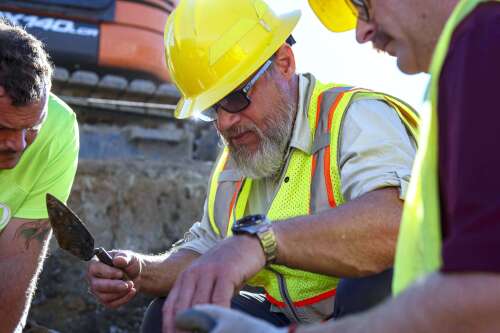David Brown, center, a 1986 graduate of Hoffman Estates High School, is a scientific recovery expert assigned to the Defense POW/MIA Accounting Agency (DPAA). Here he conducts recovery operations during a mission in, Wistedt, Germany, in September 2023.
U.S. Marine Corps/Sgt. Jack A. E. Rigsby
Friday is National POW/MIA Recognition Day, but bringing missing Americans home is a year-round focus for Hoffman Estates native and professional archaeologist David Brown.
He now employs the same techniques to find and identify U.S. military personnel from World War II and later for the Defense POW/MIA Accounting Agency within the Department of Defense as he previously did to unearth the culture of ancient civilizations.
“The skill set is really exactly the same,” said Brown from his current home in Hawaii. “We use the same scientific approaches and practices to read the terrain.”
David Brown, a scientific recovery expert assigned to the Defense POW/MIA Accounting Agency (DPAA) prepares excavation grids using surveyor equipment during a recovery mission in, Wistedt, Germany, in August 2023.
U.S. Marine Corps/Sgt. Jack A. E. Rigsby
The 56-year-old discovered his passion for archaeology at about the same time his family moved from Villa Park to Hoffman Estates in the second grade.
In addition to his academic pursuits in Schaumburg Township Elementary District 54 and at Hoffman Estates High School, he made frequent trips to the Field Museum in Chicago and with his grandparents visiting the Native American burial site of Dickson Mounds near downstate Lewistown.
“Those things really struck me and awed me,” Brown said. “Everything always led back to archaeology.”
But first he enlisted in the Army for two years before using his GI Bill benefits to pursue his academic qualifications at Harper College in Palatine, Illinois State University and Eastern Illinois University.
From there, research projects took him to New Mexico and the Philippines. Eventually the road became more and more the home of “Illinois Brown,” as others nicknamed him in college in the spirit of Indiana Jones.
“I became sort of a professional university student,” he said. “I never really looked back. I kept moving and realized archaeology isn’t in your backyard all the time. I’ve kind of been chasing tropics and deserts ever since.”
U.S. military personnel and civilians assigned to the Defense POW/MIA Accounting Agency (DPAA) conduct recovery operations during a recovery mission in, Wistedt, Germany in August 2023. DPAA personnel conducted an excavation operation in an effort to find a U.S. aircraft crew lost over Germany during World War II.
U.S. Marine Corps/Sgt. Jack A. E. Rigsby
He came to work for the Hawaii State Historic Preservation Division, but was doing consulting on his own just before his association with the DPAA began eight years ago. His military experience proved to be of great value in communicating as a civilian with his active-duty colleagues.
Though sometimes only his laboratory work is required, more difficult excavations have required his on-site presence in such diverse locales as Vietnam, Cambodia, Papua New Guinea and Germany.
Last year, he made two separate trips to Germany over a 4½-month project to free and identify 10 crew members of a B-24H Liberator bomber that had crashed into a farm field during World War II.
David Brown, far right, a scientific recovery expert assigned to the Defense POW/MIA Accounting Agency (DPAA), speaks to detectives of the Salzwedel Politz Department during a recovery mission in, Wistedt, Germany, in August 2023.
U.S. Marine Corps/Sgt. Jack A. E. Rigsby
Bringing closure to their stories is why he does what he does, but the work can become quite poignant as the recovery teams inch closer to their goals.
“It’s often emotionally overwhelming,” Brown said. “I realize what that means for the individual and their family and the nation.”
For even the distant family members of long lost Americans, answering a decades-old question has meaning, he added.
“They want to know and we’re here to provide that and honor them,” Brown said.
Next on his itinerary is another mission to Laos, that looks relatively simple on paper, but the reality won’t be known until he arrives.
DPAA operations are regularly ongoing in 46 countries, with China being the most recent partner to find common purpose with that humanitarian division of the Department of Defense.
“Part of what we do as an agency is to try to gain friendships with other nations,” Brown said.
While Brown and his colleagues hope to put themselves out of a job by finding and identifying everyone who’s still missing, he said that goal is still a long way off. In many cases, the passage of time is what makes them more difficult.
But military personnel in the 21st century are rarely getting lost in the same way due to improvements in communications technology.
Brown suggested a number of ways POW/MIA Recognition Day can be honored, including placing a wreath on the identified grave of someone who served.
“It’s a day to reflect back on those who gave all for the freedom of our nation,” he said. “It’s important the agency continue to be well funded by Congress. Remember that our freedoms came at a great cost.”
David Brown, an archaeologist with the Defense POW/MIA Accounting Agency (DPAA), rides in a helicopter while conducting an investigation mission in Papua New Guinea, in September 2018.
U.S. Air Force/Staff Sgt. Matthew J. Bruch
